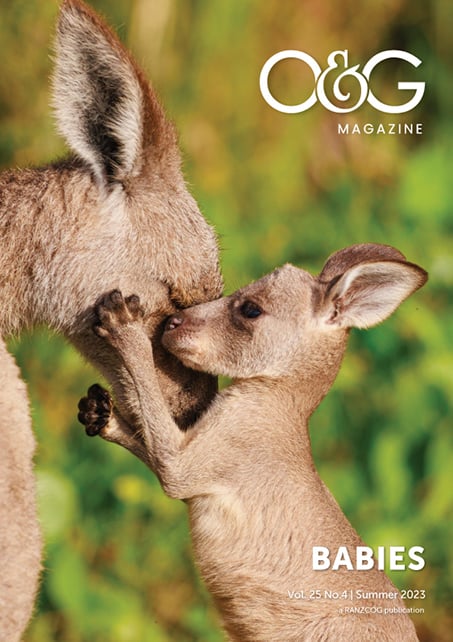The Consumer Network Working Group ‘crowdsourced’ contributions for this article from our social networks. Using prompts to inspire reflection, we gained responses from 11 consumers and community members.
Do you remember when you first held a baby? Many of our survey participants do. Jen did not hold a baby until she held her own son. She remembers thinking, ‘It is harder than this to get a driver’s licence’. However, many shared experiences of holding siblings. Julian frequently cared for baby cousins and family friends during childhood. Naomi held her baby sister at age 9.5 years in a moment of ‘pure magic and love at first sight’. Bee expressed the fear many of us feel when holding a baby for the first time, noting her baby brother ‘felt very fragile and curiously boneless’. In contrast, Halina, the eldest of eight children, became well experienced at holding babies from age two years. We might each have different levels of pre-existing ‘baby capital’ by the time we might have our own babies.
Our survey also explored societal responses, asking participants to consider the peer who was the first to fall pregnant. Michelle recalls an unmarried couple who had not been together long, and the mother-to-be taught in a Catholic school; her pregnancy was ‘a big scandal’ and people ‘said they were stupid’. Similarly, Brenda has a cousin who, at age 16 years, fell pregnant and faced condemnation. However, when a 17-year-old friend fell pregnant, her family was quite supportive; Brenda concluded that the difference in responses might have
been cultural. Keshala’s experience was that, while pregnant at age 20, she was surrounded by both excitement and concern, the latter was due mostly to her relocation to a new country. Halina’s friends were all in their 20s and married when they fell pregnant, and those pregnancies were seen as both ‘exciting and wanted’.
These responses raise a pertinent question: is there a ‘perfect’ time and circumstance in which to have a baby? Keshala shared that, in her culture, ‘starting a family young was considered the best approach’. For others, marriage is a confounding factor. Bee mentioned that, in her social circle, the perceived ‘perfect time’ for having a baby includes being married, having a stable job and a purchased home. Naomi also says it is assumed that, for anyone who has gotten married, ‘babies follow shortly after… like the next step’, but that ‘really [it] is none of anyone’s business’. Julian highlighted the specific challenges faced by transmasculine individuals: ‘People are often shocked when they learn that transmasculine people might want to have a pregnancy, even though they don’t identify as women’.
For many, age is the difference between celebration and criticism. Brenda feels pregnancies are ‘celebrated as long as you’re between 26–34’, otherwise ‘you’re too young and irresponsible or too old and risky’. Conversely, Naomi’s older sister was aged 32 when she had her first baby and their family ‘could not be happier’, indicating that context matters. Indeed, Halina mentions that ‘first babies are exciting for everyone’, and Naomi gives an example of a celebrated successful pregnancy shortly after a miscarriage. Sarah feels her context as a mother of five is relevant, sharing ‘I have never had a pregnancy that was celebrated by everyone – I was either viewed as too young, or having too many’. Michelle offers sage advice, which echoes Sarah’s experience, ‘people judge everything you do and don’t do when it comes to pregnancy [and babies]. You will never do it all right by everyone’s standards’.
Parenthood certainly offers endless opportunity to reflect. When it comes to personal wellbeing as a parent, Brenda and Bee advise to trust your instincts; Bee says, ‘I wish I’d known I can trust my baby and my instincts, and my mistakes are inevitable and forgivable’. Michelle acknowledges the exhaustion that comes with motherhood, sharing, ‘I wish I knew how tired I would be, how being tired would affect every part of my life, and how being the mum I wanted to be would affect my marriage. I wish my husband understood how temporary those years would be, and how me and the babies just needed a bit of time’. With a similar understanding of the ‘shifting sands’ of parenting babies, Naomi encourages adapting to your baby’s cues rather than sticking to rigid routines. Indeed, as Jen points out, often the parenting advice offered comes from ‘too many cooks in the kitchen – [there is] too much outside advice that is contradictory’. This can overload mums and prevent them from walking their own journey with their baby (Naomi).
Education and advocacy also appeared in respondents’ advice to readers. Laura discusses the lacking education around fertility and feels that healthcare professionals should offer comprehensive support to ‘better prepare [young people] for the complexities of conceiving a baby and help them navigate the journey with greater confidence and resilience’. Sarah wished she had known in advance ‘how much the medical system will control your experience of birth and parenting if you do not educate yourself with the research’. Both as one of eight children and a midwife, Halina sees the long-term importance of ‘pregnancy care and birth experiences [in] shaping your future and views… people should be educated better about pregnancy early on so as not to go in so blind, as many do’.
In addition to maternal education, Naomi believes babies ‘are the best teachers of what they need’; as Michelle points out, ‘babies don’t read’ parenting books. Brenda also centres knowledge around the baby, ‘Becoming a parent doesn’t make you an expert, but it does make you an expert on your child’. Sarah and Halina likewise remind us to accept our babies in all their individual glory; according to Halina, ‘All babies are different… there really is no right way to do things’.
In thinking about how maternal education and parent information would be best supplied to consumers, Keshala reflects, ‘I wished there was some sort of “wonder” years app for me as I navigated life post-partum and the overwhelming feeling of sadness which I later found out was postnatal depression and anxiety… I felt like my mental wellbeing was brushed off as a normal part of motherhood’.
In the absence of such a solution, old school ‘listening’ remains an effective alternative. Leigh recalls supporting a friend through a challenging pregnancy, at the end of which she gave birth to a girl with some special needs, which included using a feeding tube. At a time when her friend struggled with feeling unprepared, inadequate, and was worrying about her baby’s health, Leigh talked a lot with her friend – ‘sometimes just sitting together was important’. Her friend’s confidence grew as she came to understand that she and her partner were ‘the best parents for their little girl’. Brenda proactively gave similar advice to a pregnant colleague, reassuring her that ‘she is perfectly capable to handle what’s to come’. This kind of active listening was also evident in Jen’s response; she works to ‘normalise, validate and listen to all of the mixed feelings that new parents have with their babies’. Michelle explains that the ‘listening and sharing others’ stories’ allows women with babies to know that they ‘aren’t the only one feeling that way’.
In watching their friends having babies, Julian, Michelle and Bee note the value of offering practical support because ‘sometimes the smallest service has the biggest impact’ (Michelle). Food plays a big part in this. In the queer and trans community to which Julian belongs, everyone ‘pitches in’, organising meal trains, and Halina has provided new mums with food to ‘ease the burden of meal planning’. However, there is also endless washing to be done. Michelle has done ‘all sorts of things I would never have dreamed of doing for non-mum friends, like washing out their underwear or folding their husband’s clothes’, and Julian’s community coordinates cloth nappy washing. Other practical offers include Bee holding a crying baby ‘when mum needed a break to eat and pee’ and distracting a toddler ‘so mum could drink a coffee in peace’. Halina helps parents so they can ‘rest, reset and [gain] confidence in the job they are learning to do’.
Much as our babies are a manifestation of so many aspects of ourselves as parents, our journeys of pregnancy and parenthood are a similarly beautiful mix of influences; those who have walked before us, those who can guide us, and those our babies become.
Thank you to all who contributed their words and experiences to this article.
Contributors
- Julian Grace – CNWG member
- Keshala – CNWG member
- Laura – CNWG member
- Leigh – CNWG member
- Jen – mother of two, registered midwife
- Michelle – mum of three
- Brenda Klose
- Sarah Webb – allied health professional, mother of five
- Naomi – mother of five and early childhood teacher
- Halina D – midwife and mother of three
- Bee – mother of one






Leave a Reply